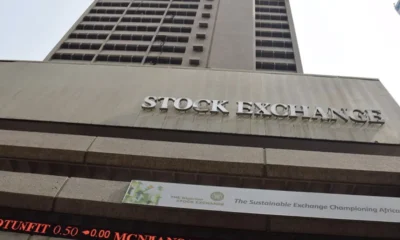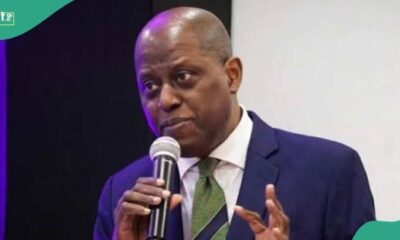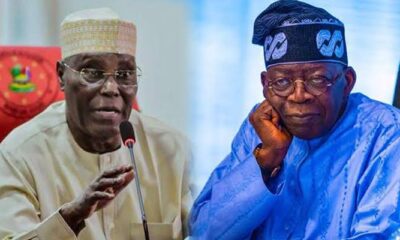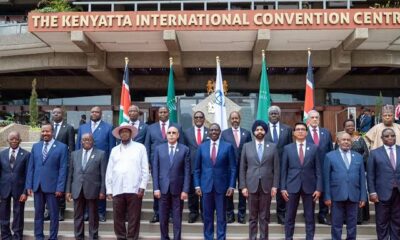Strictly Personal
From Experiment To Experience: Why the Nigerian Central Bank Needs its Traditional Navigators Back, By Chibuikem Ugo-Ngadi
Published
7 months agoon

Commerce Takes the Central Helm
If you’re tuning into this, you’re likely aware of Yemi Cardoso becoming the new chief of the Central Bank of Nigeria (CBN). His appointment, following Godwin Emefiele’s exit, is notable for another reason: both are commercial bankers, and their leadership comes at a pivotal moment for our economy.
For those who’ve journeyed with my earlier piece, ‘A Call To Action,’ I won’t delve into the detailed statistics again. However, to give you the big picture, our economy is on shaky ground. The naira’s value keeps dwindling, now taking over N1000 to match a single USD. The task of steadying this precarious situation leans heavily on the decisions and actions of the CBN and its helm.
While the trend of appointing commercial bankers to lead the CBN brings forth concerns, it’s not a question of their competency in the banking sector. They excel there. However, piloting the Central Bank has its own set of challenges distinct from commercial banking. The differences and intricacies of central banking are profound, and that’s where my reservations come into play.
Different Worlds
At first glance, central banks and commercial banks might seem to operate within the same realm – the financial sector. However, their mandates, operational scopes, risk management practices, and utilised tools delineate two distinct worlds.
Mandate:
Central banks serve a broader public interest. Their primary objective is maintaining economic stability for the nation. This means they work to control inflation and ensure steady economic growth. On the other hand, commercial banks are primarily business entities. Their driving force? Profit. They focus on attracting customers, granting loans, and providing other financial services to ensure their bottom line grows.
Scope of Operation:
Central banks have a wide lens, monitoring the entire economy. They pay close attention to various economic indicators and global trends to make informed decisions that impact the nation. Commercial banks, however, operate on a more individualized scale. They cater directly to their customers, whether individuals or businesses, offering services that respond to specific financial needs.
Risk Management:
When central banks think of risks, they’re looking at the bigger picture. They’re concerned about large-scale economic threats that can affect the whole country. Commercial banks, in contrast, handle risks that directly impact their day-to-day operations. This includes managing potential loan defaults or keeping up with shifts in the market.
Tools and Mechanisms:
Central banks use tools meant for guiding the entire economy. They employ methods like adjusting the amount of money in banks or setting key interest rates to influence economic conditions. Commercial banks, however, use their tools in a more direct manner. They decide on loan interest rates, offer deposit schemes, and introduce new financial products to attract and serve their customers better.
Navigating Two Worlds: Profit vs. Policy
Merging the distinct worlds of central and commercial banks requires careful consideration. While central banks are dedicated to ensuring national welfare and economic stability, commercial banks have profit as their primary goal. As commercial banking leaders transition into central banking roles, there’s a vital concern: could they inadvertently favour their previous domain?
This is more than just an economic dilemma—it directly influences the trust that the public places in these pillars of finance. Central banks are guardians of our financial health, setting rules to foster a robust economy. In contrast, the profit-driven nature of commercial banks often sees them navigating these rules inventively.
Furthermore, the importance of relationships in the commercial sector can’t be understated, yet central banking demands unwavering impartiality. Introducing a leader from the commercial world might blur the lines of decision-making, raising valid concerns about whether the broader economic interests remain the focal point.
Bypassing Expertise
In the intricate dance of global finance, the choreography of central banking leadership remains crucial. We’ve explored how central and commercial banks dance to different beats. Now, let’s shine a spotlight on Nigeria’s recent break from tradition.
Over the recent years, Nigeria has embarked on what can be termed a ‘recruitment experiment’. The rhythm shifted recently as the trend favoured promoting commercial bankers directly into the central bank’s top role, a distinct departure from traditional appointments. The result: Nigeria’s monetary choreography seems to have missed some crucial steps, leading to disruptions in our macroeconomic performance.
One can’t help but think this isn’t just a twist of fate. While the federal government’s fiscal choreography has certainly added complexity to the central bank’s performance, decisions like the FX Swaps, Naira Redesign Rollout, and Ways and Means Lending resonate as tunes unfamiliar to the seasoned central banking ear. It’s like a skilled ballerina suddenly trying to lead a breakdancing performance.
“Those that are doing it, do they have two heads?” as often quipped in Nigerian households. Globally, it’s a rarity to see a central bank led by someone without deep roots in central banking. While commercial bankers in other countries do occasionally don the central banker’s hat, they usually do so after an extensive apprenticeship in central bank policymaking.
Consider Jerome Powell of the US Fed: his journey from corporate banking and legal practice to the helm of the Fed spanned several years, allowing him to immerse in the central banking culture. Or Andrew Bailey of the Bank of England, whose decades-long waltz within the bank’s corridors prepared him for the top job. Even in emerging economies, leaders like Pan Gongsheng in China and Shakitanka Das in India have risen after extensive experience in their nation’s policy tapestries.
So, while commercial banking insights might offer some flair, nothing replaces the deep, nuanced expertise of a career spent in central banking. As the world’s financial ballet continues, it’s time Nigeria reconsiders its lead dancer.
The Pillars of Traditional Central Banking
Grounded Knowledge in Monetary Dynamics:
Central banking goes beyond mere figures. It’s a complex interplay of strategies, forecasts, and responses. Those who’ve spent their careers in central banking have a hands-on understanding of these complexities. They’ve been in the trenches, navigating global economic shifts, balancing inflation, and setting interest rates. This isn’t just textbook knowledge. They’ve witnessed how policy decisions play out in the real world, equipping them with insights that are tough to replicate.
Objectivity at the Helm:
In the vast world of finance, varying sectors sometimes have clashing goals. Career central bankers stand out with their honed objectivity. Their journey within the policy-centric environment of a central bank ensures they approach challenges without any tilt towards commercial banking influences. This unbiased stance guarantees decisions made prioritize the nation’s overall economic well-being.
Steady Policy Hand:
A stable economy thrives on clarity and predictability. Enterprises, investors, and the general public all benefit when there’s a consistent policy direction. Central bankers, with their repository of past experiences and policy impacts, offer this steady hand. Their decisions aren’t hasty but are rooted in long-term objectives, reducing abrupt policy changes that can disrupt markets.
Built-in Networking:
Years in the central banking sphere mean they’ve forged essential ties. They’ve worked side-by-side with diverse teams, partnered with governmental bodies, and conversed with international peers. These connections are invaluable. When a new policy is on the horizon or when feedback is needed, they have a ready network to tap into, ensuring efficient and informed decision-making.
Charting the Right Course
As Nigeria stands at the precipice of an unparalleled macroeconomic tempest, the actions of the Central Bank in the coming months will either anchor us firmly or leave us adrift. While the allure of shortcuts in policymaking might seem tempting, it’s crucial to remember that the Central Bank isn’t just another institution; it’s our nation’s flagbearer in the global financial arena. It’s our voice, our representative, asserting our place on the world stage.
The Central Bank should be our sanctuary from the pitfalls that often plague Nigerian policymaking. It should be a beacon of steadiness amidst the chaos, guiding our economic ship through tumultuous waters with an experienced hand at the helm.
To mitigate the challenges ahead, it’s imperative we revert to the tried-and-true: placing the keys of the Central Bank in the hands of those who know its every corner, its every nuance. For the health of our nation, the vibrancy of our economy, and the future of our people, it’s high time we return the Central Bank to its rightful stewards: the career central bankers.
You may like
-


Nigeria: Manufacturers’ market access key to success of AfCFTA agreement
-


FX bank swaps account for 30% of Nigeria’s external reserves— Fitch
-


Nigeria: Civil society group sues 36 govs, Wike over N5.9tn, $4.6bn loans
-


Nigeria offers oil majors faster exit if …
-


Nigeria’s Security Exchange chief to meet foreign, local crypto exchanges, others over crypto regulation
-


Nigeria’s central bank blames food inflation on govt’s purchase of palliatives
Strictly Personal
This Sudan war is too senseless; time we ended it, By Tee Ngugi
Published
1 week agoon
April 28, 2024
Why are the Sudanese Armed Forces (SAF) and the paramilitary Rapid Support Forces (RPF) engaged in a vicious struggle? It is not that they have ideological, religious or cultural differences.
Not that people should fight because of these kinds of differences, but we live in a world where social constructions often lead to war and genocide. It is not that either side is fighting to protect democracy. Both sides were instruments of the rapacious dictatorship of Omar el-Bashir, who was overthrown in 2019.
Both are linked to the massacres in Darfur during Bashir’s rule that led to his indictment by the International Criminal Court for crimes against humanity. They both stood by as ordinary, unarmed people took to the streets and forced the removal of the Bashir regime.
None of these entities now fighting to the last Sudanese citizen has any moral authority or constitutional legitimacy to claim power. They both should have been disbanded or fundamentally reformed after the ouster of Bashir.
The SAF and the RSF are fighting to take over power and resources and continue the repression and plunder of the regime they had supported for so long. And, as you can see from news broadcasts, they are both well-versed in violence and plunder.
Since the fighting began in 2023, both sides have been accused of massacres that have left more than 30,000 people dead. Their fighting has displaced close to 10 million people. Their scramble for power has created Sudan’s worst hunger crisis in decades. Millions of refugees have fled into Chad, Ethiopia and South Sudan.
The three countries are dubious places of refuge. Chad is a poor country because of misrule. It also experiences jihadist violence. Ethiopia is still simmering with tensions after a deadly inter-ethnic war.
And South Sudan has never recovered from a deadly ethnic competition for power and resources. African refugees fleeing to countries from which refugees recently fled or continue to flee sums up Africa’s unending crisis of governance.
Africa will continue to suffer these kinds of power struggles, state failure and breakdown of constitutional order until we take strengthening and depersonalising our institutions as a life and death issue. These institutions anchor constitutional order and democratic process.
Strong independent institutions would ensure the continuity of the constitutional order after the president leaves office. As it is, presidents systematically weaken institutions by putting sycophants and incompetent morons in charge. Thus when he leaves office by way of death, ouster or retirement, there is institutional collapse leading to chaos, power struggles and violence. The African Union pretends crises such as the one in Sudan are unfortunate abnormally. However, they are systemic and predictable. Corrupt dictatorships end in chaos and violence.
Tee Ngugi is a Nairobi-based political commentator.
Strictly Personal
Air Peace, capitalism and national interest, By Dakuku Peterside
Published
3 weeks agoon
April 16, 2024
Nigerian corporate influence and that of the West continue to collide. The rationale is straightforward: whereas corporate activity in Europe and America is part of their larger local and foreign policy engagement, privately owned enterprises in Nigeria or commercial interests are not part of Nigeria’s foreign policy ecosystem, neither is there a strong culture of government support for privately owned enterprises’ expansion locally and internationally.
The relationship between Nigerian businesses and foreign policy is important to the national interest. When backing domestic Nigerian companies to compete on a worldwide scale, the government should see it as a lever to drive foreign policy, and national strategic interest, promote trade, enhance national security considerations, and minimize distortion in the domestic market as the foreign airlines were doing, boost GDP, create employment opportunities, and optimize corporate returns for the firms.
Admitted nations do not always interfere directly in their companies’ business and commercial dealings, and there are always exceptions. I can cite two areas of exception: military sales by companies because of their strategic implications and are, therefore, part of foreign and diplomatic policy and processes. The second is where the products or routes of a company have implications for foreign policy. Air Peace falls into the second category in the Lagos – London route.
Two events demonstrate an emerging trend that, if not checked, will disincentivize Nigerian firms from competing in the global marketplace. There are other notable examples, but I am using these two examples because they are very recent and ongoing, and they are typological representations of the need for Nigerian government backing and support for local companies that are playing in a very competitive international market dominated by big foreign companies whose governments are using all forms of foreign policies and diplomacy to support and sustain.
The first is Air Peace. It is the only Nigerian-owned aviation company playing globally and checkmating the dominance of foreign airlines. The most recent advance is the commencement of flights on the Lagos – London route. In Nigeria, foreign airlines are well-established and accustomed to a lack of rivalry, yet a free-market economy depends on the existence of competition. Nigeria has significantly larger airline profits per passenger than other comparable African nations. Insufficient competition has resulted in high ticket costs and poor service quality. It is precisely this jinx that Air Peace is attempting to break.
On March 30, 2024, Air Peace reciprocated the lopsided Bilateral Air Service Agreement, BASA, between Nigeria and the United Kingdom when the local airline began direct flight operations from Lagos to Gatwick Airport in London. This elicited several reactions from foreign airlines backed by their various sovereigns because of their strategic interest. A critical response is the commencement of a price war. Before the Air Peace entry, the price of international flight tickets on the Lagos-London route had soared to as much as N3.5 million for the economy ticket. However, after Air Peace introduced a return economy class ticket priced at N1.2 million, foreign carriers like British Airways, Virgin Atlantic, and Qatar Airways reduced their fares significantly to remain competitive.
In a price war, there is little the government can do. In an open-market competitive situation such as this, our government must not act in a manner that suggests it is antagonistic to foreign players and competitors. There must be an appearance of a level playing field. However, government owes Air Peace protection against foreign competitors backed by their home governments. This is in the overall interest of the Nigerian consumer of goods and services. Competition history in the airspace works where the Consumer Protection Authority in the host country is active. This is almost absent in Nigeria and it is a reason why foreign airlines have been arbitrary in pricing their tickets. Nigerian consumers are often at the mercy of these foreign firms who lack any vista of patriotism and are more inclined to protect the national interest of their governments and countries.
It would not be too much to expect Nigerian companies playing globally to benefit from the protection of the Nigerian government to limit influence peddling by foreign-owned companies. The success of Air Peace should enable a more competitive and sustainable market, allowing domestic players to grow their network and propel Nigeria to the forefront of international aviation.
The second is Proforce, a Nigerian-owned military hardware manufacturing firm active in Rwanda, Chad, Mali, Ghana, Niger, Burkina Faso, and South Sudan. Despite the growing capacity of Proforce in military hardware manufacturing, Nigeria entered two lopsided arrangements with two UAE firms to supply military equipment worth billions of dollars , respectively. Both deals are backed by the UAE government but executed by UAE firms.
These deals on a more extensive web are not unconnected with UAE’s national strategic interest. In pursuit of its strategic national interest, India is pushing Indian firms to supply military equipment to Nigeria. The Nigerian defence equipment market has seen weaker indigenous competitors driven out due to the combination of local manufacturers’ lack of competitive capacity and government patronage of Asian, European, and US firms in the defence equipment manufacturing sector. This is a misnomer and needs to be corrected.
Not only should our government be the primary customer of this firm if its products meet international standards, but it should also support and protect it from the harsh competitive realities of a challenging but strategic market directly linked to our national military procurement ecosystem. The ability to produce military hardware locally is significant to our defence strategy.
This firm and similar companies playing in this strategic defence area must be considered strategic and have a considerable place in Nigeria’s foreign policy calculations. Protecting Nigeria’s interests is the primary reason for our engagement in global diplomacy. The government must deliberately balance national interest with capacity and competence in military hardware purchases. It will not be too much to ask these foreign firms to partner with local companies so we can embed the technology transfer advantages.
Our government must create an environment that enables our local companies to compete globally and ply their trades in various countries. It should be part of the government’s overall economic, strategic growth agenda to identify areas or sectors in which Nigerian companies have a competitive advantage, especially in the sub-region and across Africa and support the companies in these sectors to advance and grow to dominate in the African region with a view to competing globally. Government support in the form of incentives such as competitive grants ,tax credit for consumers ,low-interest capital, patronage, G2G business, operational support, and diplomatic lobbying, amongst others, will alter the competitive landscape. Governments and key government agencies in the west retain the services of lobbying firms in pursuit of its strategic interest.
Nigerian firms’ competitiveness on a global scale can only be enhanced by the support of the Nigerian government. Foreign policy interests should be a key driver of Nigerian trade agreements. How does the Nigerian government support private companies to grow and compete globally? Is it intentionally mapping out growth areas and creating opportunities for Nigerian firms to maximize their potential? Is the government at the domestic level removing bottlenecks and impediments to private company growth, allowing a level playing field for these companies to compete with international companies?
Why is the government patronising foreign firms against local firms if their products are of similar value? Why are Nigerian consumers left to the hands of international companies in some sectors without the government actively supporting the growth of local firms to compete in those sectors? These questions merit honest answers. Nigerian national interest must be the driving factor for our foreign policies, which must cover the private sector, just as is the case with most developed countries. The new global capitalism is not a product of accident or chance; the government has choreographed and shaped it by using foreign policies to support and protect local firms competing globally. Nigeria must learn to do the same to build a strong economy with more jobs.
EDITOR’S PICK


Chelsea offers Lukaku plus cash to Napoli for Osimhen
English Premier League club, Chelsea, is said to be willing to offer Belgium striker, Romelu Lukaku, as well as fork...


Media manager identifies bureaucratic bottlenecks as hindering access to public information
As discussions on press freedom persist, Albert Mwiinga, Station Manager of Byta FM, sheds light on the hurdles journalists encounter...


Nigeria: Manufacturers’ market access key to success of AfCFTA agreement
According to the Manufacturers Association of Nigeria (MAN), the ability of local manufacturers to compete on the continent is crucial...


Nigeria: Atiku alleges Tinubu’s son, surrogates on board of firm awarded lucrative coastal highway contract
Former Nigerian Vice President, Atiku Abubakar, has alleged that President Bola Tinubu’s son, Seyi, and his surrogates are on the...


Behind the News: All the backstories to our major news this week
Over the past week, there were many important stories from around the African continent, and we served you some of...


Nigerian retail startup Renda secures $1.9m funding to drive expansion
Nigeria’s retail startup, Renda, has announced securing a $1.9 million pre-seed round of equity and debt funding to enable it...


Burna Boy emerges Africa’s top earning artiste in the US from tours, concerts
Nigerian Afrobeats sensation, Burna Boy, has emerged as the first African artiste to stage the highest-grossing arena concerts and tours...


Nigeria’s 4x400m mixed relay, 4×400 teams qualify for Olympics
Team Nigeria on Sunday morning booked two places at the upcoming Paris Olympics Games in the Mixed 4x400m relay and...


FX bank swaps account for 30% of Nigeria’s external reserves— Fitch
Global credit ratings firm, Fitch, has claimed that approximately 30% of Nigeria’s external reserves is comprised of foreign exchange (FX)...


Nigeria: Civil society group sues 36 govs, Wike over N5.9tn, $4.6bn loans
A civil society organisation in Nigeria, Socio-Economic Rights and Accountability Project (SERAP), has dragged the 36 state governors of the...
Trending
-

 VenturesNow1 day ago
VenturesNow1 day agoFX bank swaps account for 30% of Nigeria’s external reserves— Fitch
-

 Tech1 day ago
Tech1 day agoNigerian retail startup Renda secures $1.9m funding to drive expansion
-

 Culture1 day ago
Culture1 day agoBurna Boy emerges Africa’s top earning artiste in the US from tours, concerts
-

 Politics2 days ago
Politics2 days agoAgain, Rwanda denies it attacked displaced persons in DR Congo


